A Case Of Murder (Kendall Book 6) Read online
A Case of Murder
John Holt
Phoenix Publishing – Essex - UK
© John Holt – May 2016
CONDITIONS OF SALE
John Holt has asserted his right under the Copyright, Designs and Patents Act 1998 to be identified as the author of this work.
All rights reserved. No part of this publication may be reproduced, stored in a retrieval system, or transmitted in any form or by any means, electronic, mechanical, photocopying, scanning, recording or otherwise, without the prior permission of the publisher, except by a reviewer who may quote brief passages in a review to be printed in a newspaper, magazine or journal.
This book has been sold subject to the condition that it shall not, by way of trade or otherwise, be lent, resold, hired out, or otherwise circulated without the publisher’s prior consent in any form of binding or cover other than that in which it is published and without a similar condition including this condition being imposed on the subsequent purchaser.
British Library Cataloguing in Publication Data.
A CIP catalogue record for this book is available from the British Library
Printing History
This Edition was published by Phoenix, Essex, UK, in May 2016
ISBN
ISBN-13: 978-1533045577
ISBN-10: 1533045577
Preface
The story that follows is totally fictitious. It is a story, nothing more and nothing less. All places and persons included in the story are totally imaginary, and any similarity to actual persons alive or dead, is totally co-incidentally, and unintentional.
Although many of the places mentioned do actually exist, it is only the names that are real in the story. They may, however, have been changed as necessary for my own purposes, i.e. to serve the needs of this story.
* * *
I am grateful to Lauren Ridley, of Cherryloco Jewellery for allowing me to base the Phoenix logo on her design
John Holt
Chapter One
O’Connell Street, Dublin
O’Connell Street, the bustling heart of Dublin’s fair city, was as busy as usual that Saturday morning. In fact if anything it was probably even busier than usual, for the day was the first day of the mid-Season sales. And it seemed that the whole of Ireland was there, plus a few thousand visitors from across the waters.
The day had started bright and sunny, but within the last hour or so the sky had clouded over, and the temperature had dropped several degrees. Heavy rain was now forecast for the rest of the day. Not to be put off by the inclement weather, the crowd continued on its quest, intent on one thing, and one thing only. It was eager to spend its money as fast as it could, but as wisely as possible. Looking for that elusive bargain, the people hurried from one store to the next. Amongst them, was the eager tourist soaking up the sights, and anxious not to miss out on anything.
Young and old alike, many already heavily laden with their purchases, jostled each other as they made their way along O’Connell Street. Over the O’Connell Bridge they went, and continued passed the O’Connell Memorial. On and on they continued. Passed Easons the booksellers, which was already attracting a large gathering, for there was to be a celebrity book signing later in the day.
And so the crowds continued on their way. Passed Penneys Department Store they went, and on towards the so-called Spire, the Monument of Light, a stainless steel obelisk rising one hundred and twenty metres into the air. Close by stands the imposing façade of the General Post Office, the site of the headquarters of the Easter uprising mounted by Irish republicans to end British rule, that had started in 1916. Not that anyone passing by gave that event a seconds thought as the spending quest continued.
On and on the crowds went, into Henry Street, on to Arnotts, Debenhams, and Dunnes Stores. Then on to Moore Street, where the market traders, almost a tourist attraction in themselves, were attracting customers in their usual inimitable manner, with their heavily-accented calls to the public, to come and buy their goods.
Large crowds made their way towards the south, to the gates of Trinity College and beyond. Several students were milling around by the college gates, perhaps having a quick cigarette, or a snack, before having to rush back to their lectures. There was much discussion going on, maybe about their latest girlfriend; or the recent match at Lansdowne Road; or possibly the talk was of some music concert that was due shortly; or a television programme they had seen recently; or perhaps about an upcoming exam. Then the sound of thunder, and the sudden downpour put a stop to their discussions and hastened their return inside.
Meanwhile the crowds continued relentlessly past the bronze statue of Molly Malone as she wheeled her wheelbarrow through streets broad and narrow, and continued on into Grafton Street where the first day of the Brown Thomas Spring sale had just started. A hundred yards or so further along a queue was forming outside the famous Bewleys tea-room, which was as popular as ever, perhaps more so as it offered shelter from the rain.
Just on the west side of the O’Connell Bridge, on the northern side of the River Liffey, there is a terrace of Georgian buildings. Three and four storeys high, they had once been the fashionable homes of Dublin’s well to do, the rich merchants and tradesmen, and the sea captains of old. Over the years, however, the buildings had fallen into decline, and now looked shabby and neglected. Now they were the home to a few poorer quality hotels, and the many bars, pizza parlors, fast food outlets, art shops, and boutiques that lined Dublin’s Quays.
Above the shops, and bars, there are a variety of offices servicing Solicitors, Accountants, Dressmakers and businesses of every variety you could think of. One such office, on the third floor of a non-descript building situated close to the Ha’penny Bridge, was home to Anglo-Irish Commodities, a small import and export business owned and operated by a certain Alex Peterson.
* * *
The office was small, just a single room in fact. The shared “facilities”, such as they were, were located further down the corridor. The room was sparsely furnished. An old desk situated close to the window; a battered swivel chair, a couple of filing cabinets in one corner, and some shelving, and that was about it, apart from two upright chairs for the rare visitor. On the floor there was a threadbare carpet; at the single window an old Venetian blind which no longer operated. On the desk was a solitary telephone, and two buff colored files. On the shelves there were a half a dozen more files gathering dust. It was fair to assume that the filing cabinets were no different, and similarly un-used. At first glance it would seem that business was anything but good. It fact it seemed that business was virtually non-existent.
* * *
Alex Peterson stood at the solitary window looking down at the shoppers. He shook his head, and turned away. He heaved a sigh and smiled. What did he care about departmental stores, and their sales? What did he care about the endless crowds noisily pushing their way along the thoroughfare? What did he care about the tourists with their guide books, and their cameras? He had far more important things on his mind, matter of life and death things. Maybe even his own life and death.
Alex Peterson wasn’t actually his real name. In reality he was Alexis Petrenko, a Ukrainian from a small village just to the south of Kiev. Thirty eight years old he had arrived in Ireland, illegally, via Romania, just ten months ago, setting up his trading business very soon after. However this was not destined to be the main source of his income. In fact if the truth were known Anglo-Irish Commodities had imported very little in the real trading sense of the word, and had exported even less. Peterson was, however, certainly in the import business, that much was true, although, it has to be said that the imports mainly came from Turkey,
and Afghanistan, in the form of little white bags containing a white powder. It should also be mentioned that recently Peterson had branched out, and now also imported human cargo. Illegal immigrants, especially from North Africa, and Somali, would pay large sums of money for the promise of a new life in Europe. There was also the added bonus that many of them would also bring a number of those white packages with them.
Despite appearances to the contrary, business had actually been good. In fact, it had been more than good. Peterson was doing very nicely thank you, and making not an inconsiderate income. He was considered to be one of the best in his chosen profession. He provided what was considered to be a good quality product, at what was agreed to be a fair price. He, and his merchandise, was very much in demand. He had established a regular, and, more importantly, a reliable, supplier and had built up a large eager client base.
But things had gone badly wrong just lately. Three large shipments had been lost in the past four months. Three shipments of what was considered to be the finest available, each with a street value of one point two million euros, had simply gone missing. His customers were being forced to look elsewhere. But far worse were the comments from his suppliers. His operation was being questioned, especially his security, or apparent lack of. Were the risks too high? Was he able to handle such an undertaking? Was he actually in control? Was he reliable? Perhaps Mr. Petrenko had outgrown his usefulness. Perhaps it was all too much for him. Was he actually becoming something of a liability? Was he, perhaps, too much of an un-necessary risk?
Perhaps the time had come for him to be replaced.
Peterson was far from happy. In fact he was a very worried man. Very worried indeed. He knew the score. He didn’t need a diagram. It had been spelt out for him. Spelt out in such precise terms that left very little, if anything, to the imagination. Had he any lingering doubts, they had been dispelled ten minutes ago, when he had received that telephone call, a call from his supplier. Not surprising he wasn’t happy either.
He didn’t like his merchandise getting lost so to speak. Going astray. Call it professional pride if you like, but he needed to know where the merchandise was and, most importantly, he needed to know who had taken it. He had made it clear, in no uncertain terms, that he could not – would not – run the risk of being exposed, and the entire operation jeopardized. It was all to do with control, control of the market, control of the price, control of the dealers, and control of the purchasers.
His message was quite clear. “Petrenko,” he said. “You best shape up, or ….”
The rest did not need to be said. The meaning was perfectly clear. There could be no possibility of misunderstanding. This wasn’t the first warning Petrenko had received. It wasn’t even his second. This was his third, and undoubtedly, it would be his last warning.
Next time …. Petrenko instinctively knew that there would be no next time, no more warnings. The consequences did not bare thinking about.
To Petrenko it was nothing to do with control. It was much simpler than that. To him it was theft, pure and simple. Somebody was stealing from him, ripping him off. Somebody he had trusted. He didn’t like that. He didn’t like that one bit. He drummed the desk loudly. Somebody wasn’t doing their job correctly, or worse somebody had decided to go into business for themselves, and at his expense. And he had a pretty good idea who that somebody was, and he knew the action that was needed.
He reached across the desk for the telephone, and quickly dialed a number. It was answered on the second ring.
* * *
Five minutes later Peterson had finalized his instructions.
“Do I make myself clear?” he shouted down the telephone. “You know what to do, and no slip ups. You have three days. Let me know when you’ve taken care of it.”
He slammed the handset down on to the cradle. He stood up and walked over to the window once again. Dark black clouds covered the sky. The weather matched his mood. Alright so he had given the orders. They were clear and precise, and there could be no error, but still he felt uneasy. Could he rely on them to carry out his requirements, and carry them out without fail? In view of what had been happening lately, could he really trust them any longer? Would they carry out his orders, or were they in on it, part of the team messing with him? Was there a deliberate plan to push him to one side perhaps? To mount a takeover.
There was another shipment due in a little over a month. Only two people knew about it at the present time, and that was how he was going to keep it, at least for the time being. Nothing would be allowed to go wrong this time. Nothing would be left to chance.
He shook his head. He was still uneasy. Was he safe to leave them to it, could he trust them? Or did he need to go down and see to it personally. What did they say? If you want something done, do it yourself. It was then, and only then that you could be certain that it would be done, and done correctly. But to go there himself was a risk, a risk that he wasn’t prepared to take, not for the moment, not in the circumstances.
He turned back and looked out of the window. He shook his head and smiled. There at the corner was one of those human statues. Some idiot all covered in grey, keeping absolutely still, and trying not to move. Some children were playing around, prodding and pushing, trying to get the man to move. Oddly it reminded him of the person he had just spoken to – he was stupid and like a real statue, completely unable to think for himself. He had to be told just what to do, and when. Peterson shook his head once again, and looked back at the telephone. He was now more worried than ever.
Three days he had said. Three days in which to complete the necessary business. In three days his supplier would be in town, and he would want re-assurances, confirmation that all was well. All right, so three days it was. Peterson could live with that, but woe betide them if his orders had not been complied with by that time.
Woe betide them, he thought wistfully. “And what about me,” he murmured. He stood up and walked back to the window. It was now raining quite heavily. He looked down at the street below. “Look at them,” he said watching the crowds. “What do they know?”
* * *
It was precisely three days later when Peterson received the news that he had been waiting for. The telephone suddenly rang. Peterson looked at the clock on the wall. It was just after nine. He reached for the handset. “Yes,” he said.
“Taken care of,” said a voice and hung up
Peterson smiled as he replaced the hand set. He shrugged. “Taken care of,” he repeated. Just like that. He snapped his fingers. There were no other details. Who was it? What had happened? When? Where? Who? He shook his head. It really didn’t matter did it, not now? Besides he had an idea who it was, and now they were of no further concern to him. How it had been resolved was of no interest, he didn’t need to know. In fact the less he knew the better. All he wanted to know was that it had been dealt with. Taken care of as simple as that, he had been worrying for nothing.
* * *
It was the following day that Peterson saw the newspaper report, that gave him the confirmation he needed. The banner headline on ‘The Herald’ simply, but dramatically, read ‘The Body On The Beach”. The news item went on to give details of the discovery of a body in Carrick Cove. A police spokesperson said that the body had still to be identified but there had already been an arrest. A young Englishman had been charged with the murder, and would make a Court appearance the following day.
Peterson smiled as he slowly folded the newspaper. Things were working out perfectly, in fact, with the arrest, better than he had hoped. All that was necessary now was to ensure that the charges would stick, and he was confident that would not be difficult.
The only other matter still outstanding was the recovery of the merchandise. That would be more difficult. Thirty packages, each weighing five hundred grams, with a street value in excess of fifty thousand euros each, were still missing from the last consignment. The supplier wanted them back.
Peterson wanted them back
.
* * *
Chapter Two
The Old Bailey, London
Three Months Later
“Here we are, guvnor,” a voice called out, as the taxi came to a stop. “The Old Bailey.”
Tom Kendall was the first to step out, close behind was his business associate, Mollie. He moved towards the building, guide book in hand, and already open. Mollie shook her head, her worst fears were about to come true. She heaved a deep sigh, and then turned back towards the cab driver.
“The London Central Criminal Court, commonly known as the Old Bailey, has been the capital's principal criminal court for centuries and is probably the most famous in the world,” Kendall read from the book.
“The current Old Bailey building was built in 1907 and opened by King Edward VII. The exterior is faced in Portland stone and lavishly fitted out and adorned with symbolic reminders to the public of its virtuous purpose.”
“Yeah, yeah,” said Mollie, as she walked past and stopped at the entrance. “Are we going in, or what?” she asked.
* * *
Kendall, a private detective from Miami, and Mollie, weren’t just ordinary tourists visiting Britain, seeing the sites. Although the camera around his shoulder, and the guide book in hand may have suggested otherwise. This was no holiday, well not entirely. The main reason was a recent criminal case, involving a murder. Kendall was the main prosecution witness.
* * *
“On top of the dome there is a twelve foot gold leaf statue depicting a "lady of justice" holding a sword in one hand and the scales of justice in the other,” Kendall continued to read from the guide book. He looked at Mollie. “You live and learn,” he said. “I bet you never knew that did you?”
Mollie freely admitted that no she never knew that, and more to the point, she didn’t really care. “So what,” she murmured.

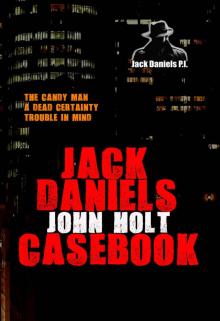 Jack Daniels - Casebook
Jack Daniels - Casebook A Case Of Murder (Kendall Book 6)
A Case Of Murder (Kendall Book 6)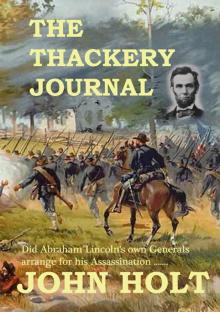 The Thackery Journal
The Thackery Journal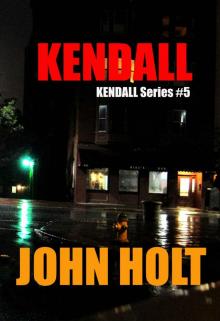 Kendall (Kendall Book 5)
Kendall (Kendall Book 5) Kendall - Private Detective - Box Set
Kendall - Private Detective - Box Set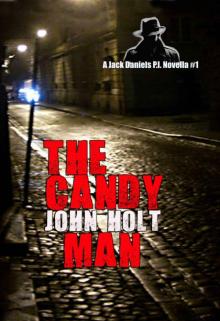 The Candy Man: A Jack Daniels P.I. Novella #1
The Candy Man: A Jack Daniels P.I. Novella #1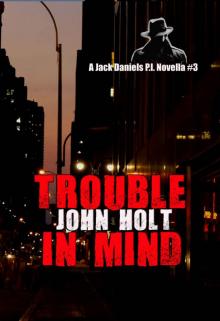 Trouble In Mind: Jack Daniels P.I. Novella #3
Trouble In Mind: Jack Daniels P.I. Novella #3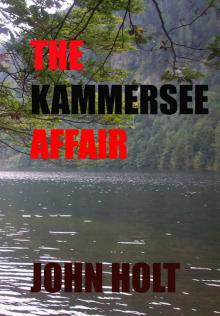 The Kammersee Affair
The Kammersee Affair